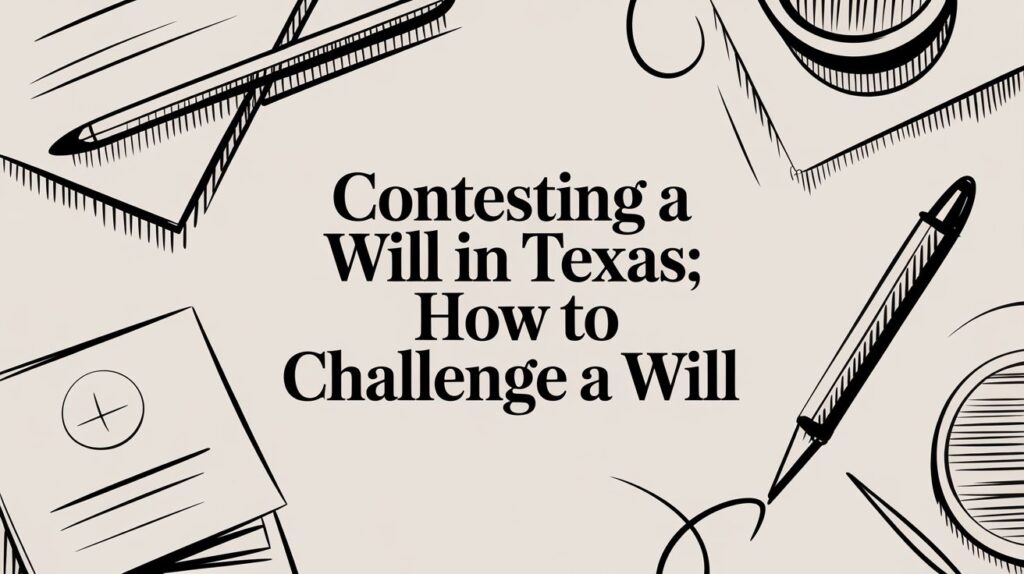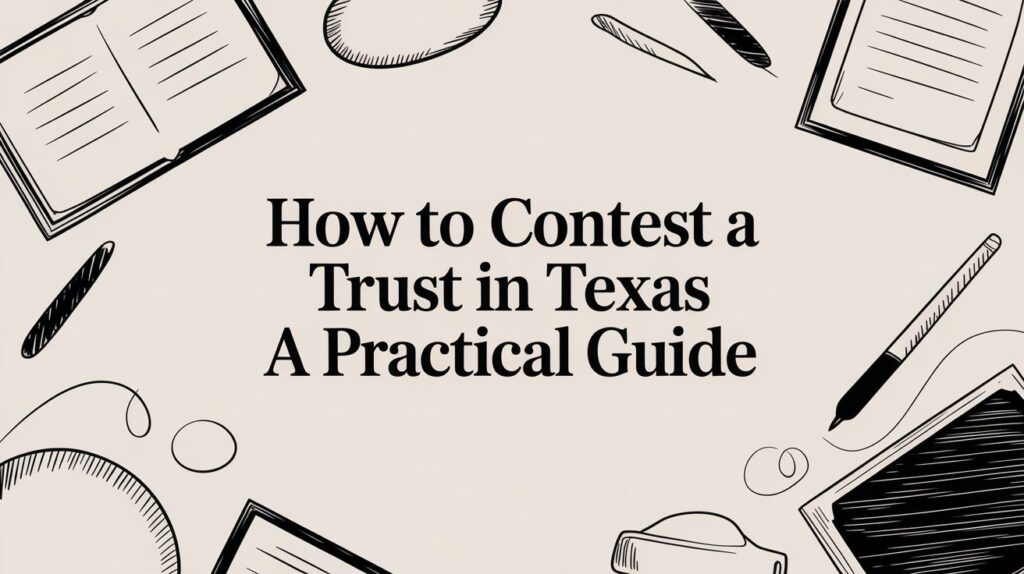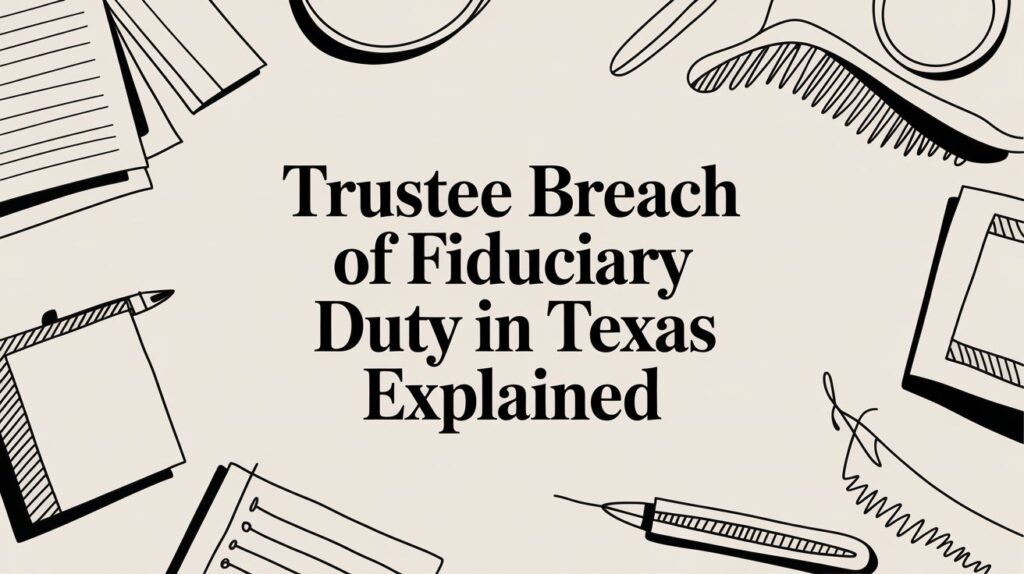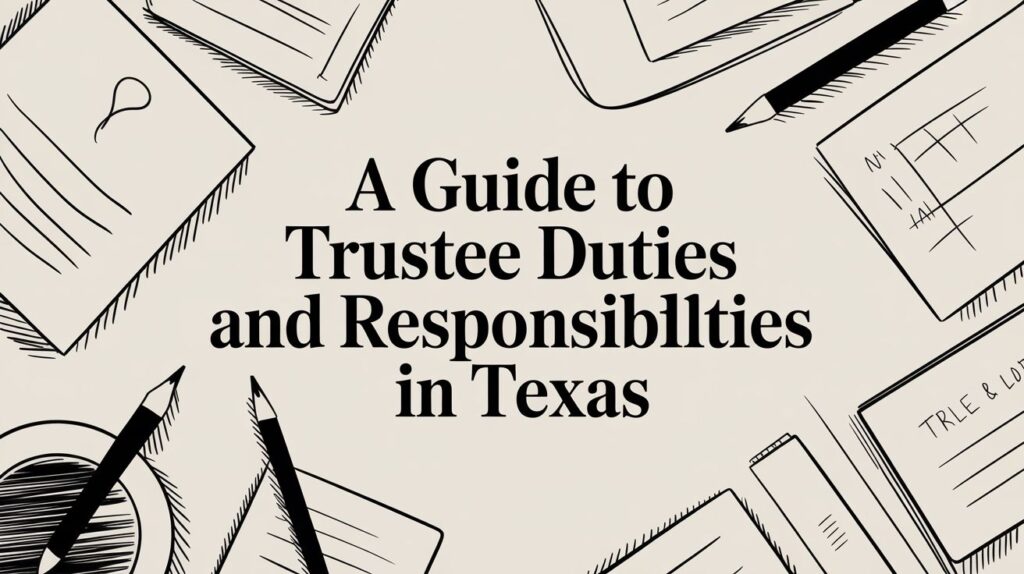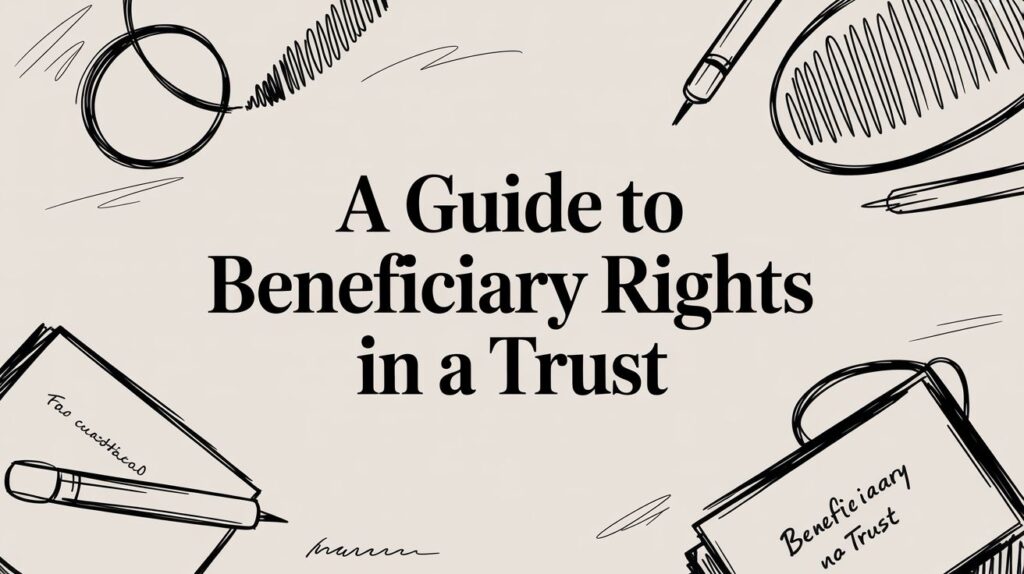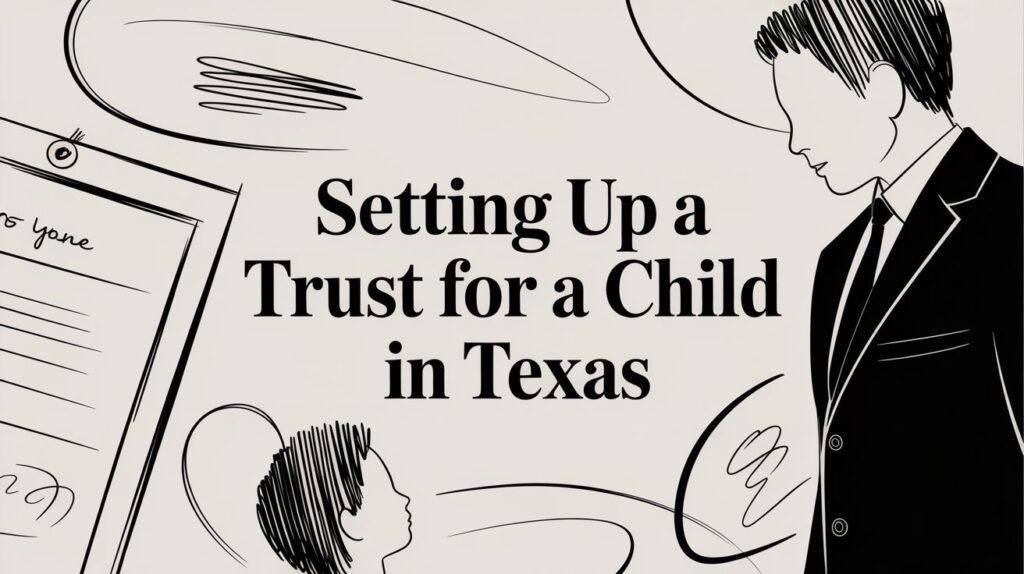Losing a loved one is difficult enough without the added stress of discovering a will that raises serious concerns. Managing a loved one's final affairs can feel overwhelming, but with the right legal guidance, you can navigate this process with confidence. When you contest a will in Texas, you are not simply arguing over assets; you are asking a court to determine if the document is legally valid and truly reflects the final wishes of the person who passed away.
Thankfully, Texas law provides a clear path for interested parties to challenge a will, but only when there are solid, evidence-based reasons to believe it was not created freely, knowingly, and voluntarily. This guide will walk you through the grounds for a will contest, the strict deadlines you must follow, and how to build a strong case.
Why and When You Can Contest a Will in Texas
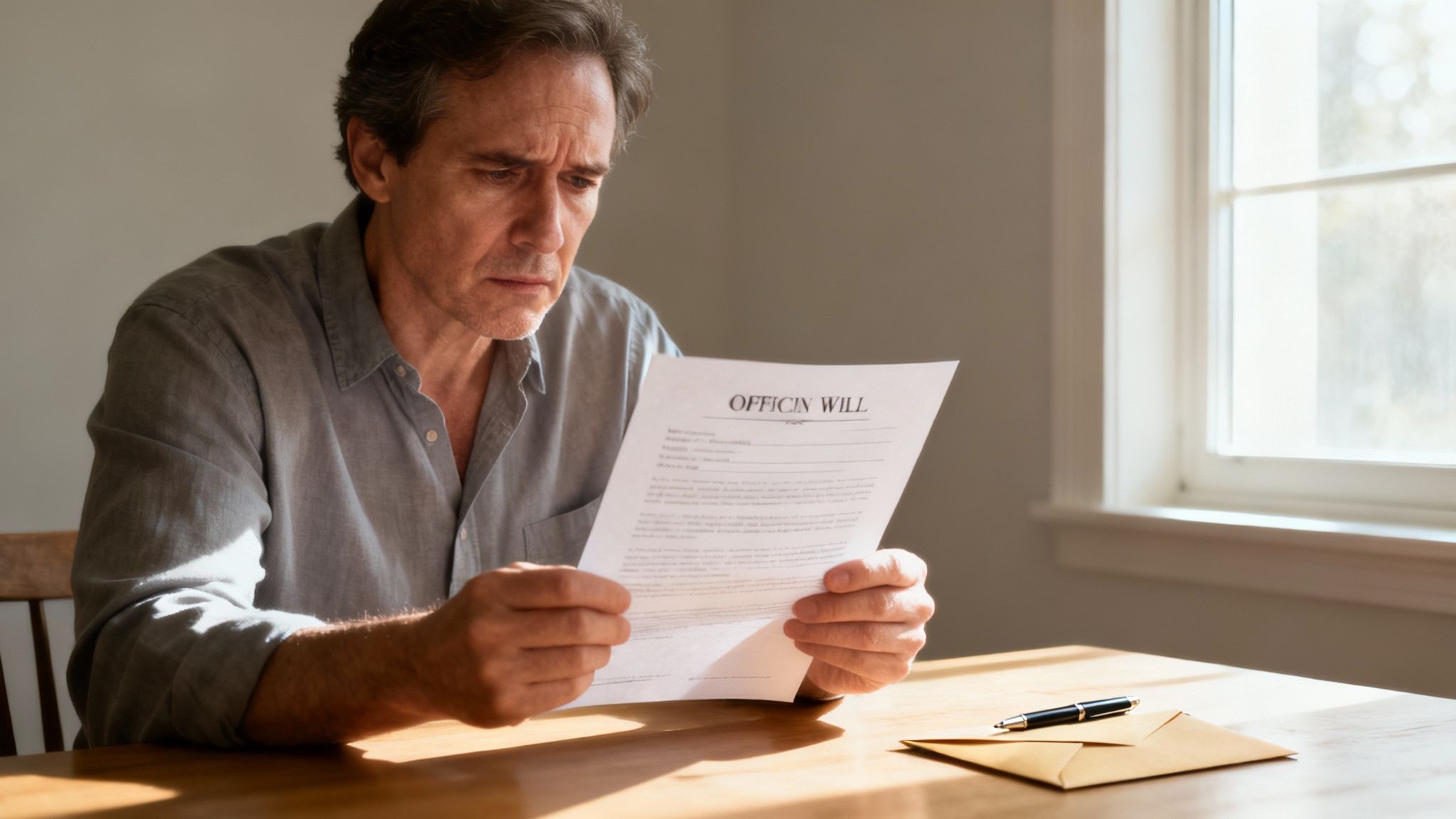
The days following a death are often filled with grief and confusion, and the reading of a will can sometimes escalate family tensions. However, a will contest is not an opportunity to air family grievances. It is a formal legal action governed by the Texas Estates Code, designed to ensure the final document is a true reflection of the testator's (the person who made the will) intentions, free from manipulation, fraud, or mental impairment.
Consider this real-world scenario: An elderly mother, who has been in declining health, suddenly changes her long-standing will. For years, her plan was to divide her estate equally among her three children. The new will, however, leaves the bulk of her assets to a new caregiver she has only known for a few months. This situation would rightfully raise red flags. It is a classic example of when contesting a will becomes a necessary step to protect your loved one’s true legacy and uphold their fiduciary principles.
Who Has the Right to Challenge a Will?
Not just anyone can walk into a Texas court and challenge a will. The law is specific: you must be an "interested person," which means you have a direct financial or property interest in the estate. This legal requirement, known as "standing," is the first hurdle. Without it, the court will not hear your case.
So, who qualifies as an interested party?
- Heirs-at-law: These are the individuals who would inherit under Texas's intestate succession laws if there were no valid will at all (typically a spouse, children, or parents).
- Beneficiaries in a previous will: If an older, valid will would have provided you with a larger inheritance, you have standing to challenge the newer one.
- Certain creditors: In some cases, individuals or businesses with a valid claim against the estate may have the right to intervene.
The court enforces this rule to prevent lawsuits from distant relatives or disgruntled friends who are simply unhappy they were not included. It ensures that only those with a legitimate, recognized interest can initiate a legal challenge.
The Foundation of a Will Contest
It is critical to understand that a successful will contest is about proving the will itself is invalid, not just unfair. The law fiercely protects a person's right to distribute their property as they see fit, even if their choices seem strange or inequitable to family members.
A will contest is not about whether the distribution of assets is fair, but whether the will is legally valid. The focus is on the testator's state of mind and the circumstances surrounding the will's creation.
This distinction is crucial. Your challenge must be built on established legal grounds, such as lack of mental capacity or undue influence. While the process can feel daunting, it exists to uphold justice and the integrity of the estate process. For those creating their own estate plan, understanding these potential pitfalls is key to preventing will contests by drafting airtight wills that can withstand legal scrutiny.
Valid Legal Grounds for a Texas Will Contest
If you are considering challenging a will, it’s important to know that simply feeling the outcome was unfair or being disappointed with your inheritance will not be enough to succeed in a Texas court. The legal system is not designed to judge the fairness of a person's choices.
Instead, you must prove that the will is legally invalid. This means demonstrating that the document does not reflect the true, free-will intentions of the person who passed away. Understanding the specific grounds for a contest is the first, most critical step in determining if you have a viable case. The Texas Estates Code is very clear about why a will can be invalidated, and the burden of proof rests on the challenger.
Lack of Testamentary Capacity
This is perhaps the most common reason for a will contest. The key is not whether the testator had a medical diagnosis or was sometimes forgetful; it is about their specific mental state at the exact moment they signed the will.
Texas law sets a clear standard for testamentary capacity. To be considered legally capable, the person signing the will must have understood four things at that moment:
- They were signing a will that would distribute their property after their death.
- They knew, in a general sense, the nature and extent of their assets.
- They could identify the people who would naturally be considered their heirs (such as a spouse or children).
- They understood how these elements combined to form a coherent plan for their estate.
A diagnosis like Alzheimer's or dementia does not automatically invalidate a will. Many people with cognitive decline experience periods of clarity. Your challenge would be to prove they lacked the required legal capacity at the time of signing, which often requires a careful review of medical records and testimony from witnesses who observed them.
Undue Influence and Coercion
This ground alleges that the testator did not act of their own free will. Instead, another person exerted such significant manipulation or pressure that it overpowered the testator's own intentions. The resulting will reflects the influencer's wishes, not the testator's.
This is more than just nagging or trying to get on someone’s good side; it is psychological control. Imagine an elderly parent who becomes isolated and completely dependent on one child who constantly speaks ill of their siblings. If that child is suddenly named the sole beneficiary in a new will, it is a significant red flag for undue influence. Proving it typically requires showing:
- An influence was exerted on the testator.
- This influence effectively subverted or overpowered the testator's mind.
- The will would not have been written in its final form but for the influence.
These cases can be challenging because the key witness—the testator—is no longer able to testify. Evidence is often pieced together from the testimony of friends, family, and financial records that may reveal a pattern of control.
Improper Execution or Formalities
Texas law has very strict rules for how a will must be signed and witnessed. If these legal formalities are not followed precisely, a judge can invalidate the entire document. This is why having an experienced attorney assist when crafting your last will and testament is so important.
For a standard Texas will to be valid, it must meet these requirements:
- The will must be in writing.
- It must be signed by the testator (or by another person signing on their behalf, in their presence and at their direction).
- Two credible witnesses, both at least 14 years old, must sign the will in the testator's presence.
Even simple mistakes can be fatal. If a witness signs the will later after leaving the room, or if one of the required signatures is missing, the will is almost certainly invalid.
Fraud or Forgery
Finally, you can challenge a will by proving it was based on fraud or is an outright forgery. While these may seem like the most dramatic grounds, they can be incredibly difficult to prove.
-
Fraud occurs when the testator was intentionally deceived. A classic example is tricking someone into signing a document by telling them it is something else, like a power of attorney, when it is actually a will.
-
Forgery is even more direct: someone faked the testator's signature or fabricated the entire will. Proving forgery usually requires testimony from handwriting experts who can analyze the signature and provide their professional opinion in court.
Will contests often arise from complex family dynamics. Blended families, second marriages, and estranged children can create an environment ripe for disputes. A skilled Texas estate planning attorney can help families navigate these issues and minimize the risk of future conflict.
Understanding the Strict Deadlines for Filing
When considering a challenge to a loved one’s will, you must understand that time is not on your side. The Texas Estates Code establishes firm deadlines, known as statutes of limitation, for filing a will contest. If you miss this window, you permanently lose your right to have a court hear your case, no matter how strong your evidence may be.
The clock officially starts ticking the day the will is "admitted to probate." This is a formal court order signed by a judge that legally validates the will. From that moment, a strict two-year countdown begins for any "interested party" to file a formal challenge. This rule provides finality to the estate process but places immense pressure on potential challengers to act swiftly.
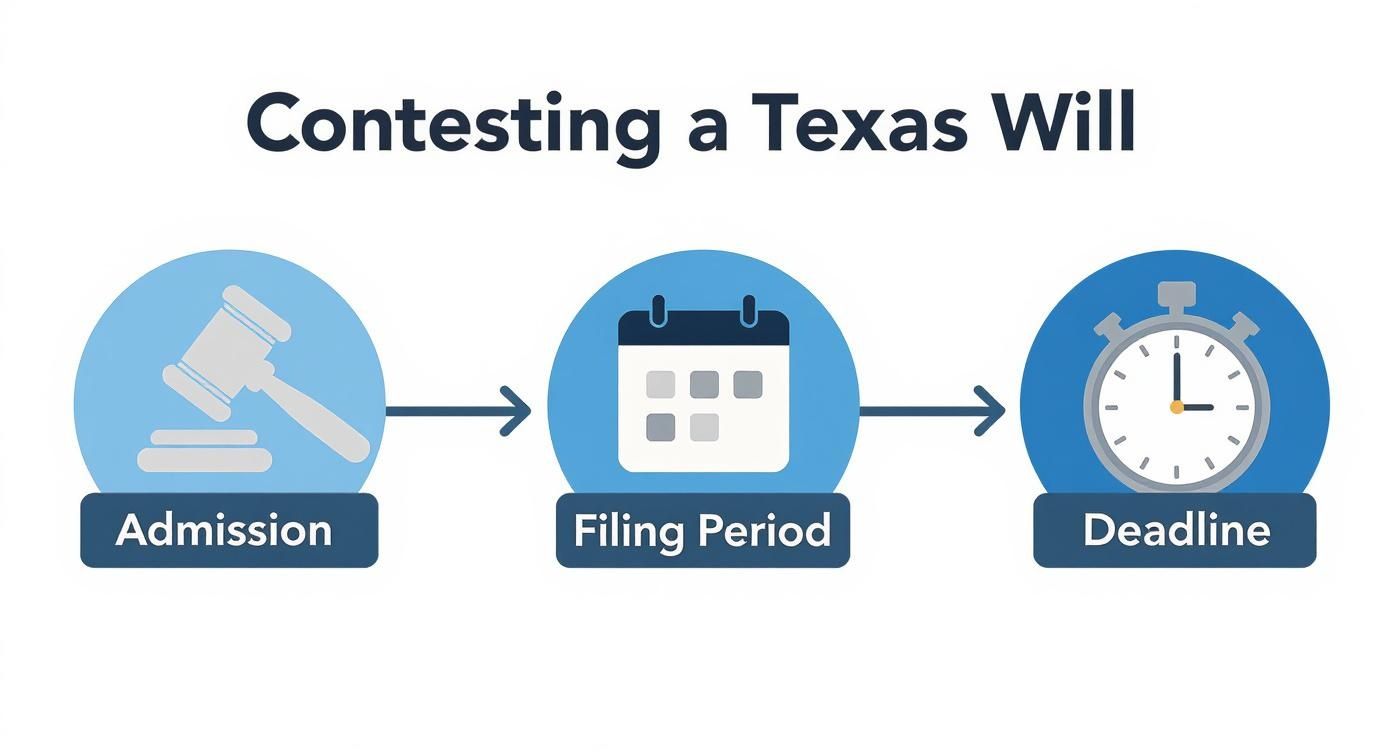
This two-year period is a finite window of opportunity. It begins with a specific court action and closes definitively, highlighting why you cannot afford to wait to seek legal advice.
The Two-Year Statute of Limitations
The general rule is clear: you have two years from the date a will is admitted to probate to file your lawsuit. For example, if a court admits a will to probate on June 1, 2024, any legal contest must be filed on or before June 1, 2026.
However, there are narrow exceptions. If your contest is based on claims of fraud or forgery, the two-year period may be extended. In these specific situations, the clock might not start running until the fraud or forgery was actually discovered—or when it reasonably could have been discovered. This exception acknowledges that some wrongdoing is deliberately concealed, providing a path to justice even after the initial deadline.
Here is a step-by-step breakdown of the key deadlines for contesting a will in Texas.
Key Deadlines for Contesting a Will in Texas
| Filing Period | Deadline | Important Considerations |
|---|---|---|
| General Contest Period | 2 years from the date the will is admitted to probate. | This is the standard deadline. The clock starts the day the judge signs the order validating the will. |
| Fraud or Forgery Exception | 2 years from the date the fraud or forgery was discovered or should have been discovered. | This is a high legal standard. You must prove the wrongdoing was hidden and could not have been found earlier with reasonable diligence. |
| Pre-Probate Contest | Any time before the will is officially admitted to probate. | Filing before the will is validated can offer a strategic advantage, but it requires immediate action. |
| Four-Year Limit on Probate | A will generally cannot be offered for probate more than 4 years after the person's death. | While not a contest deadline, this is an important outer limit for the entire probate process, with very few exceptions. |
These deadlines are unforgiving. A simple miscalculation or a "wait and see" approach can be fatal to your case. This is why contacting a Texas estate litigation attorney as soon as you have concerns is essential to preserving your legal rights.
Taking the Initial Legal Steps
Once you and your attorney decide to move forward, the process of contesting a will in Texas begins with several formal legal actions. This is not an informal complaint; you are initiating a serious lawsuit.
Your first step is to file a formal contest petition with the probate court handling the estate. This critical legal document must clearly state:
- Your identity and why you have legal standing as an "interested person."
- The specific legal grounds for your challenge (e.g., lack of testamentary capacity, undue influence).
- A summary of the facts and evidence supporting your claims.
- A clear request for the court to set aside the will.
This petition officially starts the legal process and notifies all other parties that the will is being challenged.
Notifying All Interested Parties
Filing the petition is not enough. The next step is to provide legal notice, known as "citation," to all other interested parties. This is a fundamental aspect of due process, ensuring everyone with a stake in the outcome has a fair opportunity to participate.
Who must be formally notified?
- The executor named in the will, who has a legal duty to defend it.
- All beneficiaries named in the will being contested.
- Any heirs-at-law who would inherit if the will is invalidated.
Properly serving this notice is a strict legal requirement. Failure to notify everyone correctly can cause delays or even lead to the dismissal of your case. Your attorney will manage this process, ensuring citations are issued and delivered according to Texas law. Building a strong case takes time, and your legal team must investigate claims and gather evidence before the clock runs out. For more information on probate timelines, you can find valuable resources about Texas probate timelines on texasprobateattorney.com.
How to Gather Evidence and Build a Strong Case
When you are contesting a will in Texas, suspicions and gut feelings are not enough to win in court. A judge will not overturn a will because something feels wrong. You need credible, tangible evidence. This is the stage where your personal concerns must be transformed into a solid legal argument supported by provable facts.
Building your case is a formal, structured investigation led by your attorney. It requires a strategic approach and a deep understanding of what a Texas court will find persuasive.
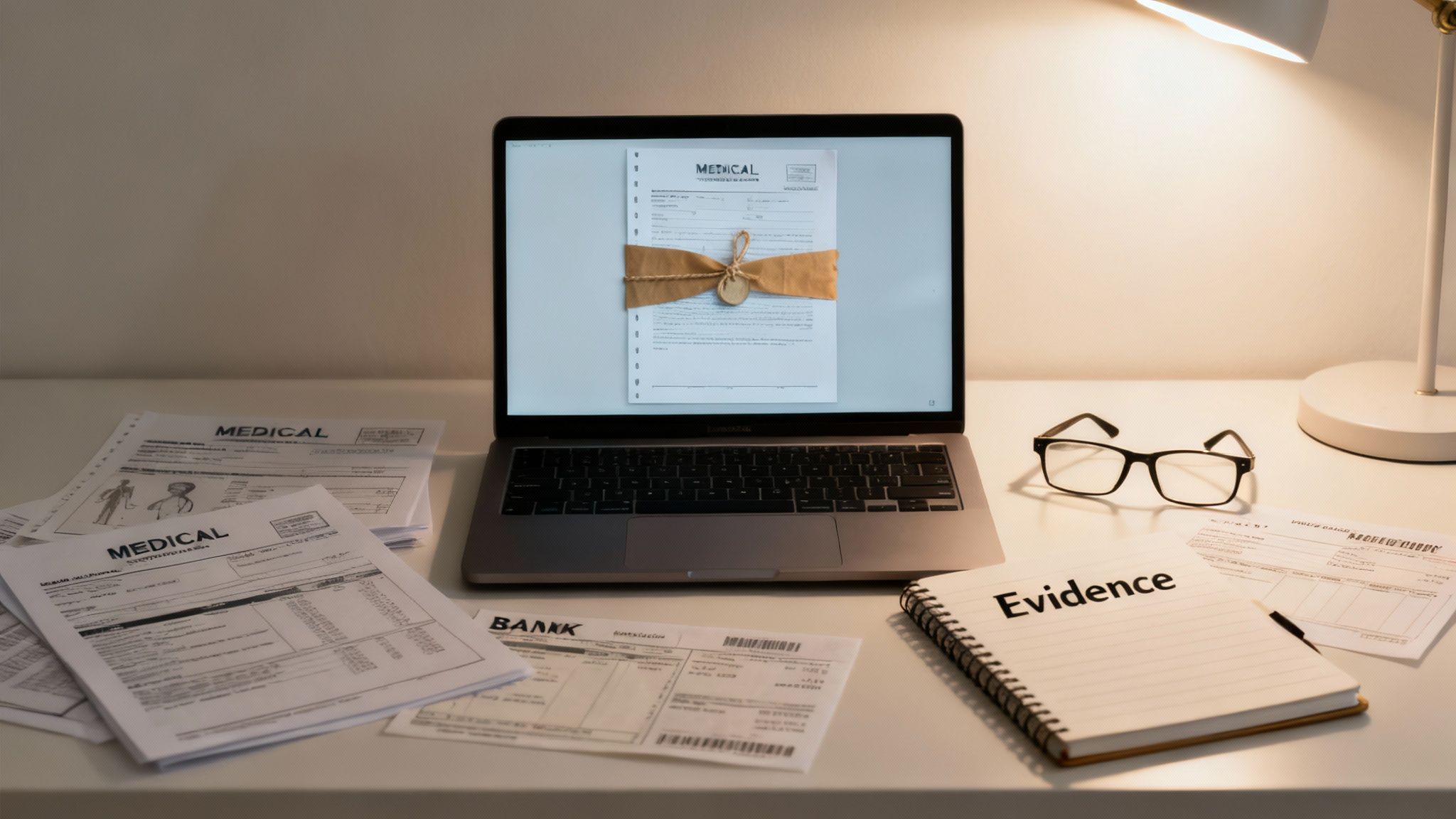
Uncovering the Facts Through Discovery
The legal system provides powerful tools to uncover the truth. Once a lawsuit is filed, we enter a formal phase called discovery. This is a court-supervised investigation where both sides are legally required to share relevant information.
We use several key tools to gather this information:
- Depositions: We question key individuals under oath outside of court. Your attorney can depose the executor, beneficiaries who gained from the new will, or the witnesses who signed it. The testimony is recorded by a court reporter and can be used as evidence at trial.
- Interrogatories: These are written questions sent to the opposing party, which they must answer in writing under oath. This is an effective way to establish specific facts, dates, and other critical details.
- Requests for Production: This is a formal demand for documents, emails, text messages, and records. It is one of the most powerful tools for uncovering the paper trail that can make or break a case.
Discovery is a methodical process. Your attorney will use these tools to systematically piece together the story of what truly happened.
Key Evidence to Look For
The type of evidence needed depends on the grounds for your challenge. Proving a lack of testamentary capacity requires a different set of facts than proving undue influence. An experienced Texas estate planning attorney knows precisely which puzzle pieces to look for.
Here is a look at the crucial evidence your legal team will seek:
- Medical and Psychiatric Records: To challenge someone's mental state, we need their complete medical history, including records from doctors, hospitals, therapists, and nursing homes. These can reveal a diagnosis of dementia, show a pattern of cognitive decline, or list medications that could cause confusion.
- Financial Statements: Financial records often tell a compelling story. Bank records, credit card bills, and investment statements can reveal suspicious activity, such as a sudden large withdrawal or a new person being named beneficiary on a life insurance policy. This is often crucial evidence of undue influence or fraud.
- Personal Correspondence: Emails, text messages, and handwritten letters can offer an unfiltered look into the testator's mind and relationships. Messages showing confusion or attempts by a beneficiary to isolate the testator from family can be incredibly powerful in front of a jury.
- Drafts of Previous Wills: Reviewing prior wills is essential. If the testator had a consistent estate plan for 20 years and then abruptly changed everything in their final months to benefit a new acquaintance, it raises a significant red flag and helps establish their true, long-held intentions.
The discovery process is designed to prevent surprises at trial. Its goal is to ensure both sides have access to the same facts so the case can be decided on its merits.
The Vital Role of Witnesses
While documents provide the foundation, witnesses bring the story to life. Testimony from people who knew the testator provides the human element and context that paper records cannot capture, painting a clear picture for the judge and jury.
Who makes a compelling witness?
- Family and Friends: Individuals who interacted with the testator regularly can testify about changes in personality, memory lapses, or how they observed someone exerting control over the testator's life.
- Healthcare Providers: Doctors, nurses, and caregivers can offer a professional, clinical perspective on the testator's mental and physical health around the time the will was signed. Their testimony often carries significant weight.
- Disinterested Third Parties: Neighbors, a long-time financial advisor, or the attorney who drafted a previous will can provide unbiased observations that are extremely persuasive because they have no financial stake in the outcome.
Building a successful will contest is a demanding, detail-oriented process. It requires a smart strategy for gathering documents and lining up credible witnesses. This entire process highlights why you need professional guidance from the moment you consider estate planning through navigating a complex probate dispute.
Navigating the Will Contest Process in Court
Filing the initial petition is just the beginning of the legal journey. The path ahead can feel intimidating, but understanding the roadmap can alleviate much of the anxiety associated with estate litigation. While every case is unique, the Texas court system follows a defined process to ensure a fair resolution.
Think of this process as a marathon, not a sprint. It requires patience and an experienced legal guide who knows the terrain. From initial filings and evidence gathering to negotiation and a potential trial, each phase serves a purpose. Knowing what to expect helps you stay focused on what truly matters: honoring your loved one's genuine wishes.
The Stages of Estate Litigation
Once the will contest is filed, the legal gears begin to turn. The first major phase is the discovery process, where your attorney formally gathers evidence using legal tools like depositions and document requests.
After discovery, the case moves toward a resolution. While many people imagine a dramatic courtroom trial, the truth is that most will contests are settled before reaching that point. A crucial step in Texas is mediation. Many probate courts require both sides to attempt mediation before they will set a trial date. This is a confidential meeting where a neutral third-party mediator helps facilitate a conversation to find common ground and reach a settlement, saving the time, expense, and emotional toll of a trial.
Understanding the Key Players
Throughout this journey, you will interact with several key individuals:
- The Contestant: This is you—the person challenging the will. You and your attorney bear the "burden of proof," meaning you must convince the court that the will is invalid.
- The Executor: This is the person named in the will to manage the estate. They have a legal duty to defend the will and will be represented by an attorney paid for by the estate.
- Other Beneficiaries: Anyone else named as an heir in the will is an "interested party." They may side with the executor to defend the will or remain neutral.
At its heart, the court process is a fact-finding mission. The judge or jury is there to hear the evidence from both sides and make a decision based on the strict rules laid out in the Texas Estates Code.
The Possibility of a Trial
If mediation is unsuccessful and no settlement is reached, the case will be scheduled for trial. This is the final stage where both sides present their evidence, call witnesses, and make their arguments to a judge or jury.
Trials can become complex, sometimes involving expert witnesses like doctors testifying about mental capacity or handwriting analysts examining a signature. In cases with complex medical evidence, securing a credible forensic expert witness can be essential to help the judge or jury understand the findings.
Navigating court hearings, deadlines, and procedural rules requires a deep knowledge of the Texas legal system. Having a seasoned probate litigation attorney is critical to making your case effectively. For a broader overview of the legal process, you can explore our guide on understanding probate in Texas.
Common Questions About Texas Will Contests
Embarking on a will contest naturally brings up many questions. The process can feel like a legal maze, but getting clear, straightforward answers is the first step toward feeling empowered. Here are some of the most common questions we hear from families facing this challenge.
Before you can fully understand how to contest a will, it helps to know the overall process. Learning what is probate and how it works provides the context for where a will contest fits into the administration of an estate.
How Much Does It Cost to Contest a Will?
This is a critical question, and the honest answer is: it depends. There is no flat fee for this type of legal action in Texas. The final cost is directly related to the complexity of the case, the value of the estate, and how vigorously the other side chooses to fight. A case that is resolved quickly in mediation will cost significantly less than one that proceeds to a full trial.
Key expenses typically include:
- Legal Fees: Your attorney may charge an hourly rate or work on a contingency fee basis. A contingency arrangement means they receive a percentage of what you recover, but only if you are successful.
- Court Costs: These are standard filing fees charged by the probate court to process the paperwork.
- Expert Witness Fees: If you need a doctor to testify about mental capacity or a handwriting expert to prove a forged signature, their professional fees will be part of the overall cost.
The best way to get a realistic estimate of potential costs is to have a transparent discussion with your lawyer at the very beginning.
Can I Be Disinherited for Contesting a Will?
This is a common fear, often stemming from a "no-contest" clause (legally known as an in terrorem clause) in the will. This clause is designed to discourage challenges by stating that anyone who contests the will and loses will receive nothing from the estate.
Fortunately, Texas law provides important protection.
The Texas Estates Code specifies that a no-contest clause is unenforceable if you bring your challenge in "good faith" and with "just cause."
In plain English, this means that if you have a legitimate, evidence-based reason to believe the will is invalid, you can challenge it without the fear of being automatically disinherited, even if you ultimately do not win. An experienced probate attorney is the best person to help you determine if your reasons meet this crucial legal standard.
What Happens If a Will Is Successfully Overturned?
If you win your case and the court declares the will invalid, the next steps depend on whether there was a previous, valid will.
If the person who passed away had a prior, legally sound will, the court will typically reinstate it. The estate's assets will then be distributed according to the terms of that document.
If there is no other valid will, the estate is considered "intestate." In this situation, Texas law dictates how the assets are divided. The property will be distributed among the deceased person's closest relatives according to a strict legal formula, with the surviving spouse, children, and parents having priority. The final outcome depends entirely on the family structure.
If you’re managing a trust or planning your estate, contact The Law Office of Bryan Fagan, PLLC for a free consultation. Our attorneys provide trusted, Texas-based guidance for every step of the process. You can learn more at https://texastrustadministration.com.

